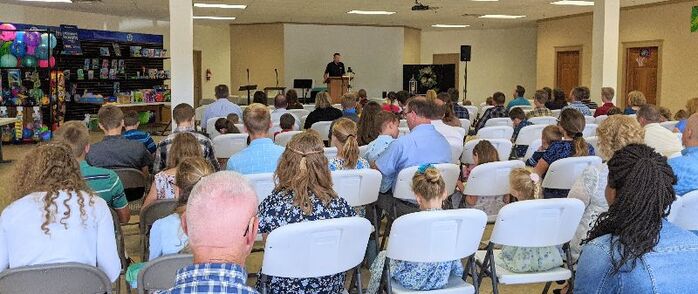|
"For an overseer, as God's steward, must be above reproach."
Titus 1:7
Biblical Leadership
... What Matters Most This is part two in a series on the office of elder. Find part one here.
In his book The Leadership Dynamic, Harry Reeder points out that a good, biblical leader will have three basic qualities: character, content, and competence.
What’s important to note is that the first is the most vital. Most leadership books will focus on competence, as if that is the most essential quality. They devote page after page to practical tips, strategies, and goals for ministry success. This is unfortunate as competency is the easiest trait to gain and (more importantly) the least significant of all the attributes of a leader. Congregations often place the greatest weight on competency too. They may seek to vote for someone who comes across as eloquent, persuasive, and “able to get things done.” While we don’t want to downplay competency, we recognize that someone can grow into the position over time. They can develop the skills and gain a proficiency in the duties of shepherding through practice and expedience. As a matter of fact, some of the best shepherds I’ve seen were blue collar men who simply took their responsibility before God seriously. Despite having a shaky start, they quickly learned to make calls, pay visits, give counsel, and offer prayers on behalf of the congregation. We recognize that competence is needed, but we should keep in mind that it is not necessarily the principle asset a leader must possess out of the gates. What is most fundamental to biblical leadership is character. Scripture underlines this expressly. As Paul lays out the qualifications of a leader, he doesn’t set out a resume of accomplishments. He points to issues of spiritual maturity: “An overseer must be above reproach, the husband of one wife, sober-minded, self-controlled, respectable, hospitable, able to teach, not a drunkard, not violent but gentle, not quarrelsome, not a lover of money. He must manage his own household well.” Character is key because character is what leadership is all about. An elder’s job is to lead the congregation into greater holiness. We must recognize that the elder's primary job is not to make the church grow numerically or develop tactics to better reach the community. Those things may happen and may be very good. Nevertheless, they are not the main responsibilities of a church officer. His role is to nurture the people in their obedience to God. That is why he himself must excel in godliness. Content is another central attribute of a biblical leader, and that will be taken up more fully in our next issue. However, it is safe to say though that there is a direct connection between character and content. This leader is spiritually mature because he is highly familiar with the content of the Bible. He has grown in faith and love because he has meditated upon the law of God and become saturated with it. So character is key. We are not looking for someone who will “take Hopewell to the next level” of ministerial effectiveness. We are looking for a shepherd; a man who has an obvious concern for biblical fidelity, be it for himself, his family, and the rest of the congregation.
Change of Worship Venue
July 15-17th the Hopewell crew will be spending the weekend at Camp Conger, just north of Willard, Ohio. Please note that our regularly scheduled worship service will take place at the camp that Sunday. Please plan to join us at 10:30 am for worship and for lunch following.
Need Help? Counsel is Available
The Word of God is sufficient to deal with all of life's problems. Whether it is anger, addiction, relationships, depression, or conflict, any problem can find its solution in the Truth God has revealed. Ask to set up a free and confidencial appointment today.
The Spirituality of a Confessional Church
"Let us hold fast the confession of our hope without wavering."
Hebrews 10:23
Hopewell is unique among churches in the Ashland area as we are a "confessional church." This is the fourth article in a series which is examining what this means and why it is important.
Be sure to check out parts 1, 2, and 3. Confessional churches are, shall we say, different. Often there is a certain feel to them. That's because the confessions typically create a unique culture. As we come to this final article on the subject of a confessional church, it may be good to think about the vibe that is produced in the church as a result of subscribing to the confessions. Here is a quick rundown of just a few of the characteristics that are common to confessional churches: 1. Vigorous, doctrinal preaching - The Confessions are, above anything else, a high commitment to the Scriptures. They summarize, what we "confess" to be true. That usually plays out in the pulpit. The depth of faith contained in these doctrinal standards enriches the level of teaching that occurs from week to week. Congregation members often gain a great deal of edification through the preaching of the Word and find it to be quite substantial for their souls. 2. Solid Ministers of the Gospel / Leadership - One reason why the teaching ministry is such a blessing is because confessional churches expect a well trained minister. Congregations expect their ministers to not only be thoroughly trained in the confessions themselves, but they must also be adeptly acquainted with the Scriptures that undergird them, the history that surrounds them, and the practices that they set forward. To put it another way, confessional churches have high standards. That transposes into a high standard for those who preach and serve as elders in the church. The laity, having bulked up on Biblical and confessional material, probably isn't going to settle for any ole schlub being in a position over them. 3. Reverence & Listening - In a Pentecostal church, you will likely see people bouncing away in the aisles. In a Fundamentalist church, you may see a loud, sweaty preacher. In a Confessional church you will likely see a degree of quiet stillness. This is not the "frozen chosen" as many jokingly call it. To the contrary, it is active engagement coupled with reverence. The confessions set forward the greatness of God and focus upon his majestic being. The confessions teach us to listen to God speak in and through his Word. The natural product is that the congregation quiets themselves so that they may revere God and give adequate attention to the means of grace. 4. Means of Grace - I had never heard this term prior to being in a confessional church. But the confessions talk a great deal about how God brings his saving grace to bear on his people. Christ accomplished our salvation and the Spirit applies it. But the Spirit works to grow us in this grace by means of the reading and preaching of God's Word, the sacraments, prayer, etc. As these things are conveyed in the confessions, it naturally leads the congregation to give specific attention to these means of grace, both in the corporate context of worship, and in individual homes. 5. Sacramental piety - Confessional churches have a well developed theology of baptism and the Lord's Supper, and, as a result, put a significant emphasis on them in worship services. The confessions themselves were written in response to a lot of the abuses of the sacraments in the Roman Catholic Church. Thus they spend a lot of time explaining the biblical teaching regarding them. In sum, the confessions tell us that the sacraments are not merely pictures of the gospel or memorials for reflection. Rather they are lively declarations of the gospel. As such they are means of grace which press the validity of God's promises in a vivid manner and help us progress in our battle against sin. 6. A Covenantal Perspective - The idea of covenant is one of the most prominent themes of Scripture. The confessions have captured this fundamental teaching in their records and communicate it effectively throughout their pages. Even though the Westminster and London Confessions have some slight nuances on the subject of covenant theology, they both concur when it comes to the basics: All humanity have become covenant breakers as a result of Adam's fall and deserve death. But the Lord redeems his people through the covenant of grace. This covenantal perspective helps make the gospel all that much more central in the context of God's people. It also serves to give students of the confessions an enriched understanding of God's call to faithful obedience. Admittedly, many non confessional churches may have some of the same distinctives. There's no doubt about that. But there is also no doubting the fact that the confessions foster a certain culture within the church. They set forward a unique spirituality and shape the practices and piety of those congregations which truly embrace them.
Join the Bee - Registration is Open!
The National Bible Bee engages young people in the memorization and study of God’s Word. Through this program our young people are united in bonds of fellowship, spiritually challenged, and strengthened in Christ. Register today to lock in your savings and your child's growth. Learn more about the Bee.
Register under hosts Rachel Johnson, Tara Beechy, or Michelle Naylor.
Overcome Anxiety for Good
For the last several weeks Hopewell has dug deeply into the issue of anxiety and shown how the Lord can deliver his people from it. If you or someone you know struggles with the issue of anxiety, be sure to check out the messages.
And join us this Lord's Day as we conclude this series as we contemplate "How Can We Keep from Becoming Anxious?"
Come join us in the land of social media!
I rejoiced with those who said to me, “Let us go to the house of the Lord.” Psalm 122:1 Meeting with God ... Why the Fuss about in Person Worship? Hopewell returned to in person worship "many moons ago." Had we not had to scoot out of Hedstrom, we may have continued meeting. However, in person worship is still hotly contested in different circles. But why does "pew sitting" matter? In the digital age, you can tune into some of the greatest speakers in the world just with a click or two. One can easily Zoom church too. Is that not soul food enough? Even without COVID there are factors that may prevent one from going out on Sunday mornings: introvertism, scheduling conflicts, relational conflict, "they are a bunch of hypocrites," shame, and the age old "I can worship God just as well (if not better) simply by taking a walk in the woods." In a day when gathered worship is not seen as vitally important, we need to rejuvenate our understanding of worship's true nature. In sum, what you get in worship is much different from what you may get through your screen or at home. Consider the following... 1) Public Worship Maximizes His Glory: While it is true that you can meet with God at home, God is most glorified in the context of corporate worship. It is truly different to sing in the confines of your house, where no one will hear or see. But when you acknowledge God publicly, in front of witnesses, the Lord receives greater honor. You "declare His glory among the nations" (Ps. 96) and enlarge the praise by virtue of an enlarged witness. 2) Public Worship Maximizes His Blessing: In Ex. 20:24 the Lord gave instructions about building an altar. Right after it he says, "Wherever I cause my name to be honored (i.e. in public sacrifices and worship), I will come to you and bless you." What does this mean? It means that greater blessings are to be found where God is openly and corporately acknowledged. While there is always a risk of sickness, there is also the blessing of increased health, protection, joy, economic security, etc. A people (and possibly even a whole community) may enjoy His bountiful favor when a group of people gather together to exalt him. 3) Corporate Worship Maximizes His Interests: We Americans like our individualism and (as a result) tend to focus on what we want or what we get out of things. But have you thought about the Lord's interests? God commanded His people to convene at the temple 3 times a year. He wanted them to drawn near to Him as a corporate body in week long increments. Psalm 87 states that the Lord loves the gates of Zion (where corporate worship takes place) more than the dwellings of Judah (where individual and family worship takes place). In sum, God is absolutely fanatical about his people gather together in person to fellowship, worship, and learn. 4) Public Worship Maximizes His Presence: In the context of gathered worship, the Lord draws near to His people in a special way, particularly during the celebration of the Lord's Table. Of the Communion service Paul says, "The cup of blessing that we bless, is it not a participation in the blood of Christ? The bread that we break, is it not a participation in the body of Christ?" (emphasis added) When we come together at the Lord's Table there is a real, spiritual meeting with Christ, where he draws near to affirm His promises and apply the benefits of his mediation. 5) Public Worship Maximizes His Loving Nurture: In the book of Revelation Jesus is depicted as standing amid the lampstands (i.e. the churches). He had drawn close to those bodies to minister his encouragements and discipline. Hebrews 10 says that we should not neglect gathering that we may be stirred up by one another. Colossians 3 talks about how the Lord works through corporate singing to teach and admonish His people. While there can be great gains through individual worship and study, the Lord puts a significant emphasis upon the spiritual socour that one gains in a gathered context. To be sure, in person worship may not be possible for some (be it illness or some other providential hindering). These small exceptions more serve to prove the ordinary rule than mitigate against it though. Yet these points are but a few reasons why there should be a earnest interest in gathering personally and corporately for worship. These examples also serve to show that Scripture puts a high emphasis on mimicking the gathered multitudes in heaven each Lord's Day. Sunday Night Fellowship! You're invited to join us at 6 pm this Sunday evening at Hedstrom. We'll be starting an informal time of worship and study. The time will consist of prayer, song, and study. We'll be focusing our attention on the OT Prophets. Children are welcome Take the Next Step @ Hopewell Have you been thinking about affiliating with Hopewell? Is your child ready to profess faith and/or be baptized? In September we will be receiving new members into our fellowship. So let us know if you would like to learn more or take the next step in your walk with Christ. Want to Talk? Let's Connect!
Is there something weighing on your soul? Do you have some questions you'd like to ask? Or are you just interested in grabbing a coffee and enjoying a time of fellowship? Let us know; our leadership is always happy to meet up. "Thy word is a lamp unto my feet, and a light unto my path." Psalm 119:105 (KJV) I Don't Know |
| Join our Live Stream via our Facebook Page |
Midweek Virtual Study
Our first run virtual Bible study series was a great success! It was so good we're doing it again. We'd love to have you join us on Wednesdays at 7 pm via our GoToMeeting video conferencing. Contact us for details if you'd like to join!
Our first run virtual Bible study series was a great success! It was so good we're doing it again. We'd love to have you join us on Wednesdays at 7 pm via our GoToMeeting video conferencing. Contact us for details if you'd like to join!
You will not fear the pestilence that stalks in darkness, nor the destruction that wastes at noonday.
Psalm 91:6
Pastoral Thoughts on the Latest Supposed Pandemic
I'm not a doctor; nor do I play one on TV. But as a pastor and amatuer theologin, I want to bring some Scriptural guidance to the current germ infested world.
I give you six thoughts on dealing with plagues and pandemics in our day:
1. Wash your hands. Doesn't sound very spiritual does it? The truth is, the single best way to prevent sickness and disease was discovered 200 years ago. Using soap and water with a good lather helps prevent the spread of disease by over 50%.
Being that is so, the Christian's responsibility of love for neighbor and self can be as simple as taking about 20 seconds at the kitchen sink.
2. Don't live in fear. If I can rephrase the words of Jesus: Do not fear the germs that can kill the body, fear Him who can destroy the body and afterwards throw the soul in hell.
God's word teaches us to fear the living God, not the bacteria that He creates. With that attitude, we live boldly in a world filled with killer pathogens. Christians are light in a germaphobe infested world.
That being the case, if God calls you to be sick or die of a plague, so let it be. Glorify God in it; be bold and suffer well.
But don't cower in corners and refuse to live a normal, God honoring life in community because you may possibly, by chance, come in contact with a random microbiome which may or may not infect your system.
3. Don't Believe the Hype: The news media may be considered a plague in and of itself (This is why I steer clear of them and wash my hands of them for the most part).
Most news outlets love the sensational and the hype it can cause. For that reason, it's hardly ever clear what on their broadcasts is true. Exaggeration, bias, and the desire to get you to buy something from their sponsors often makes them less than a healthy source of information.
From what limited research I've done (and what limited information is available), the coronavirus is not anywhere as bad as the news has hyped it to be. A little googling and you'll see that the Corona is not that much different than the common flu. It may be slightly more contagious, but its symptoms and death rates are essentially equal.
So don't be quick to believe the latest headline promulgating the end of the world. Let God be true and every man a liar.
Above all, remember what Spurgeon said:
"Faith by cheering the heart keeps it free from the fear which, in times of pestilence, kills more than the plague itself."
4. God Protects the Righteous: God is sovereign over every single microorganism on the planet. What's more, His sovereignty is always kindly expressed towards His people. And ordinarily, God protects His people from plague and consumption.
That's what Psalm 91 teaches when it says, "For he will deliver you from the snare of the fowler and from the deadly pestilence."
Of course, the Psalmist isn't teaching that God's people will never get sick or diseased or die. He's expressing the normal way God operates in this world: The Lord usually protects His people and the righteous will, by and large, be spared from the deadly woes.
It is noteworthy that those most highly affected by infectious disease are, ordinarily, those who are not living for God. To put it in the words of one commentator, those who tend to be victims of contagious diseases are the intemperate, the sensual, the debased, and foolish (...possibly the ones most unwilling to wash their hands?).
In sum, the wicked essentially bring God's destruction upon themselves as they have lifestyles that predispose them to these miseries. The godly, however, seek to live more nearly to God in all holiness and are frequently spared such sorrows.
5. God's people do get sick. No one is hermetically sealed from God's will. Job was one of the most righteous men on earth, but his health was not immune.
So, if God does bring illness into your life, it is because He has a purpose for it. Thus, it is a time to live for Him.
The Westminster Larger Catechism summarizes the Scripture on this point by saying we must "patiently bear the hand of God." That means, we must be patient in affliction, praise God for His mercies, and establish our hearts til the coming of the Lord.
Sickness is also a useful time of spiritual reflection. It is a time to remember that:
6. Live & Die boldly. It's been mentioned before in these articles that so many in our world are afraid to die. The topic can hardly even be spoken of by those whose lives are so wrapped up in this world.
Not so for us. We who are in Christ can stare death in the eye and make him blink. We do not need to avoid it or dance around the topic. We may joyfully live because death is a welcome thing. We anticipate the world to come with great longing and happily draw nearer to Jesus.
Thus, we are lights and cities on a hill in a world haunted by hell and contamination. We will die boldy if God would will it and live heartily until His grace would bring it to an end.
I give you six thoughts on dealing with plagues and pandemics in our day:
1. Wash your hands. Doesn't sound very spiritual does it? The truth is, the single best way to prevent sickness and disease was discovered 200 years ago. Using soap and water with a good lather helps prevent the spread of disease by over 50%.
Being that is so, the Christian's responsibility of love for neighbor and self can be as simple as taking about 20 seconds at the kitchen sink.
2. Don't live in fear. If I can rephrase the words of Jesus: Do not fear the germs that can kill the body, fear Him who can destroy the body and afterwards throw the soul in hell.
God's word teaches us to fear the living God, not the bacteria that He creates. With that attitude, we live boldly in a world filled with killer pathogens. Christians are light in a germaphobe infested world.
That being the case, if God calls you to be sick or die of a plague, so let it be. Glorify God in it; be bold and suffer well.
But don't cower in corners and refuse to live a normal, God honoring life in community because you may possibly, by chance, come in contact with a random microbiome which may or may not infect your system.
3. Don't Believe the Hype: The news media may be considered a plague in and of itself (This is why I steer clear of them and wash my hands of them for the most part).
Most news outlets love the sensational and the hype it can cause. For that reason, it's hardly ever clear what on their broadcasts is true. Exaggeration, bias, and the desire to get you to buy something from their sponsors often makes them less than a healthy source of information.
From what limited research I've done (and what limited information is available), the coronavirus is not anywhere as bad as the news has hyped it to be. A little googling and you'll see that the Corona is not that much different than the common flu. It may be slightly more contagious, but its symptoms and death rates are essentially equal.
So don't be quick to believe the latest headline promulgating the end of the world. Let God be true and every man a liar.
Above all, remember what Spurgeon said:
"Faith by cheering the heart keeps it free from the fear which, in times of pestilence, kills more than the plague itself."
4. God Protects the Righteous: God is sovereign over every single microorganism on the planet. What's more, His sovereignty is always kindly expressed towards His people. And ordinarily, God protects His people from plague and consumption.
That's what Psalm 91 teaches when it says, "For he will deliver you from the snare of the fowler and from the deadly pestilence."
Of course, the Psalmist isn't teaching that God's people will never get sick or diseased or die. He's expressing the normal way God operates in this world: The Lord usually protects His people and the righteous will, by and large, be spared from the deadly woes.
It is noteworthy that those most highly affected by infectious disease are, ordinarily, those who are not living for God. To put it in the words of one commentator, those who tend to be victims of contagious diseases are the intemperate, the sensual, the debased, and foolish (...possibly the ones most unwilling to wash their hands?).
In sum, the wicked essentially bring God's destruction upon themselves as they have lifestyles that predispose them to these miseries. The godly, however, seek to live more nearly to God in all holiness and are frequently spared such sorrows.
5. God's people do get sick. No one is hermetically sealed from God's will. Job was one of the most righteous men on earth, but his health was not immune.
So, if God does bring illness into your life, it is because He has a purpose for it. Thus, it is a time to live for Him.
The Westminster Larger Catechism summarizes the Scripture on this point by saying we must "patiently bear the hand of God." That means, we must be patient in affliction, praise God for His mercies, and establish our hearts til the coming of the Lord.
Sickness is also a useful time of spiritual reflection. It is a time to remember that:
- We are constantly dependent upon the Lord for our health/life.
- We may have sinned and we need to repent (James 5:14f).
- We have a future world, cleansed of sin & misery, which we anticipate.
- The terrors of hell are much worse, and we have been spared the horrors of it.
- Our brethren around the world suffer much greater tribulations, and we ought to pray for them.
6. Live & Die boldly. It's been mentioned before in these articles that so many in our world are afraid to die. The topic can hardly even be spoken of by those whose lives are so wrapped up in this world.
Not so for us. We who are in Christ can stare death in the eye and make him blink. We do not need to avoid it or dance around the topic. We may joyfully live because death is a welcome thing. We anticipate the world to come with great longing and happily draw nearer to Jesus.
Thus, we are lights and cities on a hill in a world haunted by hell and contamination. We will die boldy if God would will it and live heartily until His grace would bring it to an end.
You're 4 Years Old
A group of 9 families began meeting for evening services in March of 2016. It was the infancy of Hopewell, to be sure. But flip the calendar to 2020 and you'll find 16 families meeting together each week. Add in the young people who have turned 18 and entered adulthood and we have quite a testimony to the growth our God has granted us.
So blow out the candles, pin the tail on the donkey, praise God for His faithfulness, and party like you're ready to start riding a big boy bike.
So blow out the candles, pin the tail on the donkey, praise God for His faithfulness, and party like you're ready to start riding a big boy bike.
Let's Celebrate with Food!
We invite you to join us for our monthly fellowship dinner this Sunday. The church will provide fried chicken (with a gluten free option). Families are asked to bring a side or dessert to share if able. Drinks and place settings will also be provided.
__________________________________
"I will make him a helper fit for him."
Gen. 2:18
__________________________________
"I will make him a helper fit for him."
Gen. 2:18
__________________________________
Grasping the Woman's Divine Design
Part 2
[View part 1 of this series]
In our last issue of the Hopewell weekly, we began to consider how a woman can reflect God's nature by being her husband's helper. In this issue, we want to bring to light three more areas where women can exert their role as helper.
1. Help him grow in godliness.
Your husband is a sinner and lacks the virtues that God desires him to have. He may even have certain areas of real bondage, such as anger, sloth, addiction, or poor communication.
While the world says that you should ditch him and find someone you deserve, the Bible says otherwise. God has, in His wisdom, placed you at this side so that he can become a more righteous person.
You can increase his sanctification as you offer gentle admonishments, set before him a godly example, and react with grace and self-control to his failures.
Just as the Helper, the Holy Spirit, comes alongside us to help us overcome our sin and become more sanctified, you can encourage spiritual growth in your husband.
2. Help him in the decision making process.
You are your husband's chief advisor. Providing good counsel for the decisions he has to make is a glorious help.
Some women view their role as an excuse to get out of the decision making process. They say, "That's his job, not mine" with great relief. But decision making is just as daunting to him as it is to you. It's a huge help if you are engaged in this process.
Like a president's cabinet member, your perspective and input are vital. Even if he doesn't take your advice or chooses to go against it, your thoughts are still helpful. You allow him a chance to consider options, weigh pros and cons, and appraise alternative strategies.
3. Help him by giving him the respect he needs.
What if he doesn't take your advice? Worse yet, what if he makes the wrong decision? What do you do now? You help him by showing him the highest degree of respect. (Eph. 5:33).
You may be tempted to gloat or give the air of “I told you so,” but a godly helper seek to build her husband up and take it all in stride. She knows God is good and will glorify Himself in everything.
Keep in mind that when a man is honored, it will likely have a radical affect on him. He will want to present himself as honorable. Many women have found that putting on a respectful tone, dialogue, and body language transformed their husbands and their marriages.
It just goes to show that showing respect, even when your husband is not all that deserving, is the true help that he needs in his life.
1. Help him grow in godliness.
Your husband is a sinner and lacks the virtues that God desires him to have. He may even have certain areas of real bondage, such as anger, sloth, addiction, or poor communication.
While the world says that you should ditch him and find someone you deserve, the Bible says otherwise. God has, in His wisdom, placed you at this side so that he can become a more righteous person.
You can increase his sanctification as you offer gentle admonishments, set before him a godly example, and react with grace and self-control to his failures.
Just as the Helper, the Holy Spirit, comes alongside us to help us overcome our sin and become more sanctified, you can encourage spiritual growth in your husband.
2. Help him in the decision making process.
You are your husband's chief advisor. Providing good counsel for the decisions he has to make is a glorious help.
Some women view their role as an excuse to get out of the decision making process. They say, "That's his job, not mine" with great relief. But decision making is just as daunting to him as it is to you. It's a huge help if you are engaged in this process.
Like a president's cabinet member, your perspective and input are vital. Even if he doesn't take your advice or chooses to go against it, your thoughts are still helpful. You allow him a chance to consider options, weigh pros and cons, and appraise alternative strategies.
3. Help him by giving him the respect he needs.
What if he doesn't take your advice? Worse yet, what if he makes the wrong decision? What do you do now? You help him by showing him the highest degree of respect. (Eph. 5:33).
You may be tempted to gloat or give the air of “I told you so,” but a godly helper seek to build her husband up and take it all in stride. She knows God is good and will glorify Himself in everything.
Keep in mind that when a man is honored, it will likely have a radical affect on him. He will want to present himself as honorable. Many women have found that putting on a respectful tone, dialogue, and body language transformed their husbands and their marriages.
It just goes to show that showing respect, even when your husband is not all that deserving, is the true help that he needs in his life.
Used Bible Drive
Do you have old Bibles lying around collecting dust? Let's put them to good use! This month Hopewell will be collecting used Bibles to donate to Mission Cry. This ministry supplies pastors in devastated places around the world with resources they could not otherwise afford.
Do you have old Bibles lying around collecting dust? Let's put them to good use! This month Hopewell will be collecting used Bibles to donate to Mission Cry. This ministry supplies pastors in devastated places around the world with resources they could not otherwise afford.
YES! FOOD!
It's always a treat to eat at Hopewell! This Sunday is our traditional 2nd Sunday fellowship meal. Bring a dish and/or a side to share if you are able. There’s always an abundance, so please plan to stay and enjoy even if you can’t pull something together. Table settings will be provided.
It's always a treat to eat at Hopewell! This Sunday is our traditional 2nd Sunday fellowship meal. Bring a dish and/or a side to share if you are able. There’s always an abundance, so please plan to stay and enjoy even if you can’t pull something together. Table settings will be provided.
__________________________________
"I will make him a helper fit for him."
Gen. 2:18
__________________________________
"I will make him a helper fit for him."
Gen. 2:18
__________________________________

The Lord created Eve for a special purpose: To emulate Him in this world.
God is our helper and he created women specifically to express that one aspect of His splendid nature (Ps 54:4; 46:1, 121:1, etc.). His divine design for women is that they may be their husbands' help mate for life.
But how does a woman fulfill this wonderful role? The following are just a few areas where your help as a wife is needed.
1. Companionship
Eve filled a distinct void in Adam's life. He needed a friend.
Scripture tells us that it was “not good that man should be alone.” Adam was created with a deficiency. Adam experienced this deficiency as he went around naming the animals. He found that not one could keep him from being lonely or give him the real companionship that he desired.
As a wife you help your husband by being a meaningful source of entertainment, conversation, and friendship. By your humor, encouragement, listening ear, and faithful presence, you help your man to get the most out of this life.
2. Leadership
A man is called to lead, but he will also fail to lead. When he abdicates his role his wife can be a tremendous help.
This doesn’t mean taking over the leadership. His wife should not say, “Well, I must do it then. If he won’t, I will.” She may be forced into this position if a man does not step forward, but this isn't to be her first line of action. A woman should find ways to encourage her husband and help him be the leader he should.
Complimenting him when he does lead (i.e. disciplines the kids) can be one way of engaging him more in his role. Asking, "What do you think we should do in this situation?" can prompt him to lead in decision making. Offering good advice or a gentle reminder (not a nag) can be a helpful thing too.
He needs your help in leading and being the man he should be.
3. Sexual fulfilment
You know that whole "burn with desire" thing mentioned in 1 Corinthians? This has particular application for men, and the importance of physical intimacy for a man cannot be overlooked. (As a matter of fact, I wanted to put this as #1 on the list, but I thought it may come across as weird. So I backed it down here to #3.)
The truth is, God gave men a robust sexual drive. And women would do well to remember that a man's sexual temperament is quite a bit different from hers. Men have an incredible need in this area and you may be a good help to your man by fulfilling his desires in this area.
That means being the initiator from time to time and considering how frequently you come together. You may want to flirt with your husband and let him know you desire him. You may want to even set aside particular nights for intimacy. A routine can help ensure he is not going unfulfilled.
4. Work
Adam's task was to take dominion and it's obvious that Eve's role was to assist in fulfilling that calling.
Through most of history the wife would work alongside her man doing the chores on the farm. Her help was very much a tag team affair. But even despite the Industrial Revolution, a woman can still be a great help to a man's productivity.
Paul calls women to be "keepers/workers at home." The word is literally a "house guardian." By tending to the daily household affairs and managing the children, a woman enables a man to thrive in his vocation. Sure he will have responsibilities around the house, but a good home guardian will help her husband be more productive in his work. He won’t be unnecessarily distracted or drained, but will have the energy and focus he needs to accomplish his day to day labors.
To be continued...
God is our helper and he created women specifically to express that one aspect of His splendid nature (Ps 54:4; 46:1, 121:1, etc.). His divine design for women is that they may be their husbands' help mate for life.
But how does a woman fulfill this wonderful role? The following are just a few areas where your help as a wife is needed.
1. Companionship
Eve filled a distinct void in Adam's life. He needed a friend.
Scripture tells us that it was “not good that man should be alone.” Adam was created with a deficiency. Adam experienced this deficiency as he went around naming the animals. He found that not one could keep him from being lonely or give him the real companionship that he desired.
As a wife you help your husband by being a meaningful source of entertainment, conversation, and friendship. By your humor, encouragement, listening ear, and faithful presence, you help your man to get the most out of this life.
2. Leadership
A man is called to lead, but he will also fail to lead. When he abdicates his role his wife can be a tremendous help.
This doesn’t mean taking over the leadership. His wife should not say, “Well, I must do it then. If he won’t, I will.” She may be forced into this position if a man does not step forward, but this isn't to be her first line of action. A woman should find ways to encourage her husband and help him be the leader he should.
Complimenting him when he does lead (i.e. disciplines the kids) can be one way of engaging him more in his role. Asking, "What do you think we should do in this situation?" can prompt him to lead in decision making. Offering good advice or a gentle reminder (not a nag) can be a helpful thing too.
He needs your help in leading and being the man he should be.
3. Sexual fulfilment
You know that whole "burn with desire" thing mentioned in 1 Corinthians? This has particular application for men, and the importance of physical intimacy for a man cannot be overlooked. (As a matter of fact, I wanted to put this as #1 on the list, but I thought it may come across as weird. So I backed it down here to #3.)
The truth is, God gave men a robust sexual drive. And women would do well to remember that a man's sexual temperament is quite a bit different from hers. Men have an incredible need in this area and you may be a good help to your man by fulfilling his desires in this area.
That means being the initiator from time to time and considering how frequently you come together. You may want to flirt with your husband and let him know you desire him. You may want to even set aside particular nights for intimacy. A routine can help ensure he is not going unfulfilled.
4. Work
Adam's task was to take dominion and it's obvious that Eve's role was to assist in fulfilling that calling.
Through most of history the wife would work alongside her man doing the chores on the farm. Her help was very much a tag team affair. But even despite the Industrial Revolution, a woman can still be a great help to a man's productivity.
Paul calls women to be "keepers/workers at home." The word is literally a "house guardian." By tending to the daily household affairs and managing the children, a woman enables a man to thrive in his vocation. Sure he will have responsibilities around the house, but a good home guardian will help her husband be more productive in his work. He won’t be unnecessarily distracted or drained, but will have the energy and focus he needs to accomplish his day to day labors.
To be continued...
Solid Help When You Need It
Life can be hard. If you are facing difficulties, avail yourself to great resources you have at Hopewell. Our church's leadership is always willing to help you through difficult times and give you biblical guidance on the problems you face.
Life can be hard. If you are facing difficulties, avail yourself to great resources you have at Hopewell. Our church's leadership is always willing to help you through difficult times and give you biblical guidance on the problems you face.
Worship, Grow, & Gain Friends
We'd love for you to connect with the Hopewell crew. Join us this Sunday and taste a little of the great things that the Lord is doing in our midst.
We'd love for you to connect with the Hopewell crew. Join us this Sunday and taste a little of the great things that the Lord is doing in our midst.
Expository Preaching | Edifying Worship | Godly Fellowship

Do you pray? Okay, good. Now let me ask you this: How do you pray? Do you pray with the firm confidence that the Lord will certainly hear and answer your prayers?
I want you to pray, and I want you to pray OUTRAGEOUS prayers. When I say outrageous, I mean prayers that would seem to be completely absurd and virtually impossible. World impacting, life changing, kingdom exploding type prayers.
Because you will be heard and God will answer!
How do I know? Because God challenges us to pray. In Psalm 27:8 he says, "Seek my face." This is what I call a 'promissory command.' God commands you to seek his face. It is an obligation that put us under a mandate. But the command implies a promise: God will answer.
God commands us to seek him because he is ready to be found. He will answer our prayer and bring his power and grace to bear on our situation.
The New Testament provides the echo and extended commentary on this verse: Ask, seek, knock. For whoever asks will receive, whoever seeks will find, and whoever knocks, to him the door will be opened.
This command (and implied promise) gives warrant to our prayers. We can be encoruaged to pray. And we can be encouraged to pray for spectacular things.
So be absurd. Ask for the outrageous.
Don't be bashful. God tells us to seek his face.
John Knox was known to pray, "Lord, Give me Scotland or I'll die." He wanted the whole nation to be taken over by the Reformational ideas he was preaching. Was that ludicrous? Absolutely! And God was happy to answer in asounding ways.
Bloody Mary (i.e. Mary, Queen of Scots) said, "I fear the prayers of Knox more than all the armies of England." She feared that protestantism would roll through England and that she'd be unseated by the finger of God simply because a man was passionately pleading with God for the transformation of the nation.
The Heidelberg Catechism cites Psalm 27:8 in its 116th Q&A. It says that we should"
"be firmly assured that, notwithstanding how unworthy we are of it, God will, for the sake of Christ our Lord, certainly hear our prayer, as he has promised us in His Word."
I pray that you may pray with the confidence that no prayer bounces off the ceiling. May this also increase and enrich your prayer life.
I want you to pray, and I want you to pray OUTRAGEOUS prayers. When I say outrageous, I mean prayers that would seem to be completely absurd and virtually impossible. World impacting, life changing, kingdom exploding type prayers.
Because you will be heard and God will answer!
How do I know? Because God challenges us to pray. In Psalm 27:8 he says, "Seek my face." This is what I call a 'promissory command.' God commands you to seek his face. It is an obligation that put us under a mandate. But the command implies a promise: God will answer.
God commands us to seek him because he is ready to be found. He will answer our prayer and bring his power and grace to bear on our situation.
The New Testament provides the echo and extended commentary on this verse: Ask, seek, knock. For whoever asks will receive, whoever seeks will find, and whoever knocks, to him the door will be opened.
This command (and implied promise) gives warrant to our prayers. We can be encoruaged to pray. And we can be encouraged to pray for spectacular things.
So be absurd. Ask for the outrageous.
- Ask that Hopewell will swell to 300 godly saints.
- Pray that abortion will be ended.
- Beseech Him for revival
- Make a request that persecution will stop in North Korea and China
- Pray that missionaries would be funded and whole nations be transformed.
Don't be bashful. God tells us to seek his face.
John Knox was known to pray, "Lord, Give me Scotland or I'll die." He wanted the whole nation to be taken over by the Reformational ideas he was preaching. Was that ludicrous? Absolutely! And God was happy to answer in asounding ways.
Bloody Mary (i.e. Mary, Queen of Scots) said, "I fear the prayers of Knox more than all the armies of England." She feared that protestantism would roll through England and that she'd be unseated by the finger of God simply because a man was passionately pleading with God for the transformation of the nation.
The Heidelberg Catechism cites Psalm 27:8 in its 116th Q&A. It says that we should"
"be firmly assured that, notwithstanding how unworthy we are of it, God will, for the sake of Christ our Lord, certainly hear our prayer, as he has promised us in His Word."
I pray that you may pray with the confidence that no prayer bounces off the ceiling. May this also increase and enrich your prayer life.
Pray with Spurgeon (.pdf)
Is your prayer life feeling dry? Maybe what you need is a little variety! What better way to spice up your prayer life than praying the prayers of Charles Spurgeon? This ebook contains many prayers composed by Spurgeon. Using it in your daily devotions can bring edification and nuance to your prayer life.
Is your prayer life feeling dry? Maybe what you need is a little variety! What better way to spice up your prayer life than praying the prayers of Charles Spurgeon? This ebook contains many prayers composed by Spurgeon. Using it in your daily devotions can bring edification and nuance to your prayer life.
Got Issues?
Life is hard. Sometimes you need help dealing with your issues. That's precisely what God's Word does. If you're dealing with "stuff," schedule a time to talk to one of our leaders. They will gladly help you find the way.
Life is hard. Sometimes you need help dealing with your issues. That's precisely what God's Word does. If you're dealing with "stuff," schedule a time to talk to one of our leaders. They will gladly help you find the way.

________________________
"During supper, when the devil had already put it into the heart of Judas Iscariot, Simon's son, to betray him..."
John 13:2 ESV
________________________
"During supper, when the devil had already put it into the heart of Judas Iscariot, Simon's son, to betray him..."
John 13:2 ESV
________________________
This Lord's Day we will begin a new study in the gospel of John. We'll be looking at the upper room narative, in particular (chapters 13-17).
As I began my studies, I was struck by how much of chapter 13 is devoted to (of all people) Judas, the Betrayer. Almost a third of the verses center around this fiend of a man.
Even more interesting were the comments by John Gill in reference to verse 2. Gill picks apart what happened to Judas and shows us how his fall into perdition was begotten. Gill gives us an anatomy of Judas' seduction and shows us how each of us should take care to not follow the same route into oblivion.
"Let anyone who thinks that he stands take heed lest he fall." We do good to heed this instruction and consider how Judas, a man chosen by Christ and designated to the high office of apostle, was seduced into becoming a Satanic force.
Therefore, remember...
1. Your status means nothing: Judas may have held the most significant ecclesiastical office, but that did not provide any security to his heart. Jesus had chosen him to be an apostle (a leader, a teacher, a miracle worker, etc) and invested him with profound authority. Nevertheless, he was but a man filled with evil appetites. Thus he was not immune from the vilest of temptations.
We do well to remember that no matter our standing, we are constantly dependent upon divine grace to remain faithful. We may climb the corporate ladder or attain a place of prominence within the church, but we are still sons of Adam. We must therefore seek God's favor constantly, asking for Him to guard our hearts and deliver us from the evil.
2. It can happen anytime / anywhere: The verse says that it was "during supper" (or possibly soon before the meal) that Judas' determined to betray our Lord.
There he was, in the presence of Christ himself, enjoying the Passover holiday. He was involved in a rite of worship. It was a religious festival where almost every dinner movement had some sort of spiritual lesson.
Despite the holiness of the occasion, the devilish thought darted into his mind. While hymns were sung, Satanic suggestions echoed in his ears and calcified his heart.
"No place and company can preserve persons from the evil suggestions of the devil," says Gill. So we must remember that though we enter a church building or participate in a worship service, we are still susceptible to untold folly.
The only protection we have is the gracious assistance of the Spirit upholding and preserving us at all times.
3. Your festering sin can open the door to greater misdeeds. Gill points out that in the previous chapter Judas was in a huff over the fact that Jesus was anointed with precious oil. Satan took this opportunity and used it to his diabolical advantage.
"Do not let the sun go down on your anger, lest you give the devil a foothold." Judas illustrates the words of Eph. 4:27.
We must remember that Satan loves warm coals of sin. He will not let them smolder and die out. He takes advantage of it and stokes the irksome attitude to achieve greater villany.
If you can do anything to resist the devil, it is this: Repent quickly and subdue anger. Kill the beast of sin before the Beast of Sin kills you.
As we consider how Judas was seduced, we may learn from his mistakes. We are not ignorant of the wiles of the devil and we can steer clear of them. And, as we seek the Lord's favor and strive to maintain a godly comportment, we can have hope of remaining true to God.
As I began my studies, I was struck by how much of chapter 13 is devoted to (of all people) Judas, the Betrayer. Almost a third of the verses center around this fiend of a man.
Even more interesting were the comments by John Gill in reference to verse 2. Gill picks apart what happened to Judas and shows us how his fall into perdition was begotten. Gill gives us an anatomy of Judas' seduction and shows us how each of us should take care to not follow the same route into oblivion.
"Let anyone who thinks that he stands take heed lest he fall." We do good to heed this instruction and consider how Judas, a man chosen by Christ and designated to the high office of apostle, was seduced into becoming a Satanic force.
Therefore, remember...
1. Your status means nothing: Judas may have held the most significant ecclesiastical office, but that did not provide any security to his heart. Jesus had chosen him to be an apostle (a leader, a teacher, a miracle worker, etc) and invested him with profound authority. Nevertheless, he was but a man filled with evil appetites. Thus he was not immune from the vilest of temptations.
We do well to remember that no matter our standing, we are constantly dependent upon divine grace to remain faithful. We may climb the corporate ladder or attain a place of prominence within the church, but we are still sons of Adam. We must therefore seek God's favor constantly, asking for Him to guard our hearts and deliver us from the evil.
2. It can happen anytime / anywhere: The verse says that it was "during supper" (or possibly soon before the meal) that Judas' determined to betray our Lord.
There he was, in the presence of Christ himself, enjoying the Passover holiday. He was involved in a rite of worship. It was a religious festival where almost every dinner movement had some sort of spiritual lesson.
Despite the holiness of the occasion, the devilish thought darted into his mind. While hymns were sung, Satanic suggestions echoed in his ears and calcified his heart.
"No place and company can preserve persons from the evil suggestions of the devil," says Gill. So we must remember that though we enter a church building or participate in a worship service, we are still susceptible to untold folly.
The only protection we have is the gracious assistance of the Spirit upholding and preserving us at all times.
3. Your festering sin can open the door to greater misdeeds. Gill points out that in the previous chapter Judas was in a huff over the fact that Jesus was anointed with precious oil. Satan took this opportunity and used it to his diabolical advantage.
"Do not let the sun go down on your anger, lest you give the devil a foothold." Judas illustrates the words of Eph. 4:27.
We must remember that Satan loves warm coals of sin. He will not let them smolder and die out. He takes advantage of it and stokes the irksome attitude to achieve greater villany.
If you can do anything to resist the devil, it is this: Repent quickly and subdue anger. Kill the beast of sin before the Beast of Sin kills you.
As we consider how Judas was seduced, we may learn from his mistakes. We are not ignorant of the wiles of the devil and we can steer clear of them. And, as we seek the Lord's favor and strive to maintain a godly comportment, we can have hope of remaining true to God.
Are you interested in becoming a member of Hopewell? It is a way to make your commitment to Christ more visible and enjoy more of the benefits of Christ's care. Feel free to check out the process for becoming a member on our website. Then let us know your interest; we'd love to talk with you about it.
We'd love for you to join us for worship. If you are looking for a church home, or just a place to learn about Christianity in general, we invite you to visit us Sundays at 10:30 am. We meet in the conference room at Hedstrom Plastics (100 Hedstrom Drive).
Have you ever had the feeling that you missed worship, despite having sat through the entire service? You sang the songs and were there, but it was like driving in open country: you look back and don't remember the last several miles.
It may be that you leave with a blank sheet because you were not properly prepared to engage in it. Worship is much like anything else in that regard. If you just run into a grocery store without a lot of forethought, you're likely going to miss a few things you should have gotten.
How much more true is this in regards to worship, that sacred time of meeting with God?
When the Israelites were to meet with God, they didn't just waltz up to the foot of Mt. Siani. They took two days to consecrate themselves. Washings, meditation, reflection, prayer, repentance, not to mention tidying up any items pertaining to the household and work.
In the NT we read about the "Day of Preparation." (Luke 23:54) Jesus' body was hurriedly stowed away in the tomb because the Sabbath was about to start. The Israelites recognized they needed to get ready for the Sabbath. It was so important that they denominated the Friday before as the "Day of Preparation."
The same holds true for us. Scripture encourages us to maximize worship through intentional acts of preparation. How do we do that? Here are some suggestions:
1. Plan your work and work your plan: Don't let the household chores flow over to Sunday. Make a point to get all your work (occupational and household chores) done prior to Sunday. That way it's not hanging over your head and consuming your mind while you are supposed to be concentrating on things of a more divine nature.
Remember the Sabbath day, to keep it holy. Ex. 20:8
2. Get a good sleep: Everybody knows that "Saturday night live" makes for "Sunday morning dead." By all means, have a great time on Saturdays and enjoy an evening out, but make a habit of getting to bed in good time. A good 7-8 hours of sleep will help keep your eyelids from drooping and your brain from dragging.
3. Devote to Devotions: Just because you're going to church doesn't mean you should skimp on Bible time. Athletes are encouraged to visualize their performance prior to games; to mentally go through their footwork and "get stoked" for the game. In a similar way, taking time to read, reflect, pray, and sing Saturday night or Sunday morning will prime your heart for the main event.
4. Monitor the Mouth: As with any day, a healthy breakfast is vital for one's attention. Binging on donuts or sweets the night before will likely reduce your ability to participate in worship in an engaging fashion.
5. Concentrate on Contrition: Humility breeds worship and repentance paves the way for it. For God can't dwell with sin. Being that this is so, it's always good at the end of a week to look back and take an inventory of the ways you've fallen short. You then can confess these things and fulfill James' admonition to "draw near to God, and he will draw near to you.".
6. Reconcile: You're going to have spats and quarrels, but you shouldn't bring that baggage into worship with you. Scripture behooves you to settle matters quickly and prior to bringing your sacrifice of praise. When you do this, not only will you be honoring God's command, but your mind will be free from replaying the argument in a million ways.
7. Rise & Shine: Sunday is for sleeping in because it is a day of relaxation, right? Sure, but don't get too carried away. You want to leave enough time for your morning routine and for getting out the door in good time. Nothing ruins worship like driving like a wild hyena and shuffling in late to the pews.
8. Pray for the Service: Your time in worship depends quite a bit on the faulty vessels up front. If you really want them to perform well, pray for them. The music and ministry of the Word come with greater beauty and meaning when they are padded with your supplications.
"Finally, brothers, pray for us, that the word of the Lord may speed ahead and be honored." 2 Thess. 3:1
9. Come Eagerly & Expectantly: Let's not forget that we must tune our attitudes. God's probably going to descend in thick clouds and fire, but you can still find Him if you're looking for Him. Even the worst service can be beneficial if we seek the Lord and the things He would have for us there.
"My soul longs, yes faints, for the courts of the Lord." Ps. 84:2
10. Invite others: No, this is not a cheap way to get you to help grow the church. It is a true means of preparation. When you invite someone, you are planning ahead. You are getting in the "church groove." And besides, there's nothing better than knowing a buddy is going to be there with you in worship.
"I was glad when they said to me, 'Let us go to the house of the Lord.'" Ps. 122:1
It may be that you leave with a blank sheet because you were not properly prepared to engage in it. Worship is much like anything else in that regard. If you just run into a grocery store without a lot of forethought, you're likely going to miss a few things you should have gotten.
How much more true is this in regards to worship, that sacred time of meeting with God?
When the Israelites were to meet with God, they didn't just waltz up to the foot of Mt. Siani. They took two days to consecrate themselves. Washings, meditation, reflection, prayer, repentance, not to mention tidying up any items pertaining to the household and work.
In the NT we read about the "Day of Preparation." (Luke 23:54) Jesus' body was hurriedly stowed away in the tomb because the Sabbath was about to start. The Israelites recognized they needed to get ready for the Sabbath. It was so important that they denominated the Friday before as the "Day of Preparation."
The same holds true for us. Scripture encourages us to maximize worship through intentional acts of preparation. How do we do that? Here are some suggestions:
1. Plan your work and work your plan: Don't let the household chores flow over to Sunday. Make a point to get all your work (occupational and household chores) done prior to Sunday. That way it's not hanging over your head and consuming your mind while you are supposed to be concentrating on things of a more divine nature.
Remember the Sabbath day, to keep it holy. Ex. 20:8
2. Get a good sleep: Everybody knows that "Saturday night live" makes for "Sunday morning dead." By all means, have a great time on Saturdays and enjoy an evening out, but make a habit of getting to bed in good time. A good 7-8 hours of sleep will help keep your eyelids from drooping and your brain from dragging.
3. Devote to Devotions: Just because you're going to church doesn't mean you should skimp on Bible time. Athletes are encouraged to visualize their performance prior to games; to mentally go through their footwork and "get stoked" for the game. In a similar way, taking time to read, reflect, pray, and sing Saturday night or Sunday morning will prime your heart for the main event.
4. Monitor the Mouth: As with any day, a healthy breakfast is vital for one's attention. Binging on donuts or sweets the night before will likely reduce your ability to participate in worship in an engaging fashion.
5. Concentrate on Contrition: Humility breeds worship and repentance paves the way for it. For God can't dwell with sin. Being that this is so, it's always good at the end of a week to look back and take an inventory of the ways you've fallen short. You then can confess these things and fulfill James' admonition to "draw near to God, and he will draw near to you.".
6. Reconcile: You're going to have spats and quarrels, but you shouldn't bring that baggage into worship with you. Scripture behooves you to settle matters quickly and prior to bringing your sacrifice of praise. When you do this, not only will you be honoring God's command, but your mind will be free from replaying the argument in a million ways.
7. Rise & Shine: Sunday is for sleeping in because it is a day of relaxation, right? Sure, but don't get too carried away. You want to leave enough time for your morning routine and for getting out the door in good time. Nothing ruins worship like driving like a wild hyena and shuffling in late to the pews.
8. Pray for the Service: Your time in worship depends quite a bit on the faulty vessels up front. If you really want them to perform well, pray for them. The music and ministry of the Word come with greater beauty and meaning when they are padded with your supplications.
"Finally, brothers, pray for us, that the word of the Lord may speed ahead and be honored." 2 Thess. 3:1
9. Come Eagerly & Expectantly: Let's not forget that we must tune our attitudes. God's probably going to descend in thick clouds and fire, but you can still find Him if you're looking for Him. Even the worst service can be beneficial if we seek the Lord and the things He would have for us there.
"My soul longs, yes faints, for the courts of the Lord." Ps. 84:2
10. Invite others: No, this is not a cheap way to get you to help grow the church. It is a true means of preparation. When you invite someone, you are planning ahead. You are getting in the "church groove." And besides, there's nothing better than knowing a buddy is going to be there with you in worship.
"I was glad when they said to me, 'Let us go to the house of the Lord.'" Ps. 122:1
Now that you know how to get ready for worship, come and fill your soul! Join us this Sunday at 10:30 am for a blended worship. We're located in the conference room at Hedstrom Plastics.

___________________
No good thing will he withhold from them that walk uprightly.
Psalm 84:11
____________________
No good thing will he withhold from them that walk uprightly.
Psalm 84:11
____________________
This past week we saw crazy amounts of rain. It's likely that some of it ended up in your basement. For others, much of it ended up in your basement.
If that latter, it likely had some devastating effects: it ruined carpet, equipment, and leaves the lingering possibility of mildew build up.
Then there's the clean up, the bills, and the ever so tight fisted insurance guy with whom you have to deal.
This is just one example of the various providences that come our way on a daily basis. If this wasn't your experience, you can no doubt fill in the blank with your own horror story.
Let's pause here and get some perspective. Put on your Biblical lenses and consider what has happened. Weigh these events from God's point of view:
"The Lord withholds no good thing from them that walk uprightly."
If you translate the double negative, it means that God is astoundingly liberal in his goodness. When it comes to His children, He is a fountain that gushes with radical generosity.
You may need to read it again and again to convince yourself. Most do not see the Lord in this light. Typically our theology of God and His goodness is quite impoverished. We see Him as gaunt and comparable to Pharoah's skinny cows.
This ought not to be so. Scripture is clear: God withholds no good thing from his people. The blessings of His covenant are secured in Christ and "the Lord has promised good to me."
Do you think something bad has happened? Do you feel that heaven is against you? Think again.
It is not possible for God to hold back any good from you. The gate of His eternal benevolence is open wide to you and it ever flows in your direction.
You will say, "Why then do I not have riches and health and honor? Why are these good things withheld from me? All I have is a basement full of water!"
If God has given you such things, it was for your good. He is to be praised for it. If He withholds them, it is for your blessed welfare. They would not serve your betterment and advancement in life.
God would rather have you stoop under the pains and difficulties of trials. He would rather cultivate in you humility, dependence, and faith. These are His gems and treasures; they have greater profit than those things which your carnally crave.
Even as you stand in the ankle deep waters of your basement, remember that before you are overflowing buckets of his generosity. So too is the peace of mind that you may have in the midst of it.
If that latter, it likely had some devastating effects: it ruined carpet, equipment, and leaves the lingering possibility of mildew build up.
Then there's the clean up, the bills, and the ever so tight fisted insurance guy with whom you have to deal.
This is just one example of the various providences that come our way on a daily basis. If this wasn't your experience, you can no doubt fill in the blank with your own horror story.
Let's pause here and get some perspective. Put on your Biblical lenses and consider what has happened. Weigh these events from God's point of view:
"The Lord withholds no good thing from them that walk uprightly."
If you translate the double negative, it means that God is astoundingly liberal in his goodness. When it comes to His children, He is a fountain that gushes with radical generosity.
You may need to read it again and again to convince yourself. Most do not see the Lord in this light. Typically our theology of God and His goodness is quite impoverished. We see Him as gaunt and comparable to Pharoah's skinny cows.
This ought not to be so. Scripture is clear: God withholds no good thing from his people. The blessings of His covenant are secured in Christ and "the Lord has promised good to me."
Do you think something bad has happened? Do you feel that heaven is against you? Think again.
It is not possible for God to hold back any good from you. The gate of His eternal benevolence is open wide to you and it ever flows in your direction.
You will say, "Why then do I not have riches and health and honor? Why are these good things withheld from me? All I have is a basement full of water!"
If God has given you such things, it was for your good. He is to be praised for it. If He withholds them, it is for your blessed welfare. They would not serve your betterment and advancement in life.
God would rather have you stoop under the pains and difficulties of trials. He would rather cultivate in you humility, dependence, and faith. These are His gems and treasures; they have greater profit than those things which your carnally crave.
Even as you stand in the ankle deep waters of your basement, remember that before you are overflowing buckets of his generosity. So too is the peace of mind that you may have in the midst of it.
Ministry Spotlight:
Ashland Christian Health Center
This month we are collecting donations for our friends at the Ashland Christian Health Center. Items include: Manilla envelopes, legal size (non-window) envelopes, reams of colored copy paper, rolls of paper towels, Depends pull ups (esp. larger sizes XL and 2 XL), and $20 visit vouchers.
This ministry serves those who lack or have little insurance coverage by providing affordable medical care. Learn more about ACHC
Ashland Christian Health Center
This month we are collecting donations for our friends at the Ashland Christian Health Center. Items include: Manilla envelopes, legal size (non-window) envelopes, reams of colored copy paper, rolls of paper towels, Depends pull ups (esp. larger sizes XL and 2 XL), and $20 visit vouchers.
This ministry serves those who lack or have little insurance coverage by providing affordable medical care. Learn more about ACHC
Family Day @ the Lillo's
Come join the fun this Saturday (July 27)! We'd love to have your fellowship as we swim, eat, and hang out. Lunch is scheduled for 1pm, but you can join us anytime in throughout the afternoon. Friends are welcome!
Come join the fun this Saturday (July 27)! We'd love to have your fellowship as we swim, eat, and hang out. Lunch is scheduled for 1pm, but you can join us anytime in throughout the afternoon. Friends are welcome!
Membership @ Hopewell
Are you interested in membership at Hopewell? Is a young one ready to make a profession of faith / be baptized? We'd love to have that conversation or help you learn more.
Are you interested in membership at Hopewell? Is a young one ready to make a profession of faith / be baptized? We'd love to have that conversation or help you learn more.

______________________________
Whoever conceals his transgression will not prosper,
but he who confesses and forsakes them will obtain mercy.
Proverbs 28:13
______________________________________
Whoever conceals his transgression will not prosper,
but he who confesses and forsakes them will obtain mercy.
Proverbs 28:13
______________________________________
We have our own version of this proverb. It goes like this: It's my way or the highway.
Yet, when it comes to stubborn persistence in sin, we must recognize that God is not tolerant. He demands holiness in the inward parts.
If someone tries to cover their sin, and does not confess and forsake it, the Lord, you may be sure, will withhold his favorable kindness.
"No sin is too great for him to forgive, but no sin is too small for him to overlook either," said the great commentator, Charles Bridges.
You can easily see how it is excused. It is only a small sin, it is not flagrant or scandalous. It will not do any harm!
Tell that to Adam. A mere bite of an apple plunged all mankind into a world of sin and misery. Ananias and Sapphira know that their concealment had significant penalties attached to it.
When sin is not adequately repented of, the Lord will not allow one to prosper. Death is the wages of sin, and God will allow it to wreak its cursed havoc among those who coddle it.
It's miserable regressions can come in different ways:
Any one or a combination of these pains are the just deserts of sin. The Lord will save the sinner, but the sinner must apply the means God has appointed. He must confess and forsake his sin.
So do yourself a favor. When your sin is brought to your attention, take it to the Lord. Flee from it and find reprieve from its devastating effects. Enjoy the fruit that comes by means of confessing and forsaking it.
Yet, when it comes to stubborn persistence in sin, we must recognize that God is not tolerant. He demands holiness in the inward parts.
If someone tries to cover their sin, and does not confess and forsake it, the Lord, you may be sure, will withhold his favorable kindness.
"No sin is too great for him to forgive, but no sin is too small for him to overlook either," said the great commentator, Charles Bridges.
You can easily see how it is excused. It is only a small sin, it is not flagrant or scandalous. It will not do any harm!
Tell that to Adam. A mere bite of an apple plunged all mankind into a world of sin and misery. Ananias and Sapphira know that their concealment had significant penalties attached to it.
When sin is not adequately repented of, the Lord will not allow one to prosper. Death is the wages of sin, and God will allow it to wreak its cursed havoc among those who coddle it.
It's miserable regressions can come in different ways:
- The conscience may be stricken (Gen 52.21),
- Health may be afflicted (Ps 32.3),
- Plans may be thwarted (1 Sam 15:21),
- Life may be cut short (Prov. 7.),
- Prayers may be hindered (1 Pet. 3.7)
- Money may be lost (Prov. 5.10)
- Reputations may be shamed (Matt 23.25f)
- Jobs/promotions may be kept at bay (Lk 15.15)
- Happiness may be frustrated (Ps. 31.10)
- Social calamity may befall (Deut 28)
- And many, many, more!
Any one or a combination of these pains are the just deserts of sin. The Lord will save the sinner, but the sinner must apply the means God has appointed. He must confess and forsake his sin.
So do yourself a favor. When your sin is brought to your attention, take it to the Lord. Flee from it and find reprieve from its devastating effects. Enjoy the fruit that comes by means of confessing and forsaking it.
What is Reformed Theology?
What makes Hopewell distinct? One of the most significant factors is our commitment to Reformational theology. You can get to know our beliefs through this wonderful study series by RC Sproul. (Available in audio & video)
What makes Hopewell distinct? One of the most significant factors is our commitment to Reformational theology. You can get to know our beliefs through this wonderful study series by RC Sproul. (Available in audio & video)
Suggest a Song
Is there a song you've been wanting to sing in worship? Do you have a tune you'd like to see if we can add to our repertoire? We're always open to your suggestions. Just let us know what you'd like & we'll see what we can do!
Is there a song you've been wanting to sing in worship? Do you have a tune you'd like to see if we can add to our repertoire? We're always open to your suggestions. Just let us know what you'd like & we'll see what we can do!

Parenting can be tough. It can be even tougher when your children have become adults. But what do you do if your grown child leaves the church and lives a secular life?
Sometimes covenant children do not continue in the faith once they leave the home. While we hope for the best, we know that many children don't end up continuing in the faith.
Parents may feel as though there is nothing they can do. But this couldn't be farther from the truth. Parents forever remain the single most effective agent in their child's spiritual nurture.
What's more, Scripture gives us guidelines to how to parent to the glory of God even after they have left the house.
1. Pray: Never underestimate the effectual working of parental prayer (James 5:16). Augustine, who is considered one of the church's greatest theologians, attributes his late-in-life conversion to the prayers of his mother, Monica.
Since it is God who convinces and converts sinners, get on your knees. Pray for their hearts, pray that they meet other Christians, pray that they read and hear Scripture, pray that they may be kept from temptation, pray that they would be convicted repeatedly, pray that they may recollect the spiritual nurture they received in early life (John Newton was converted later in life by remembering Scripture verses which were drilled into him when he was 6 years old).
2. Evaluate yourself and get right with God: Our child's road to repentance may begin with our own. No parent is perfect, but sometimes parents can be guilty of "provoking their child to wrath." Some households have missed the boat on "bringing them up in the nurture and instruction of the Lord." (Eph. 6:4)
If this is the case, there is no need to wallow in guilt. God's grace covers a multitude of sins. What's more, there is still great opportunities to parent in the adult years. But we need to be honest, confess where we failed, and make efforts to change. We don't want our ongoing parenting to continue to make the same mistakes.
3. Ask for forgiveness (if necessary): Show your child true brokenness for sin. If you were legalistic, overly harsh, or critical in their younger days, go to them. Admit you were wrong to do that and sincerely ask them for their forgiveness. This is what God wants, and it can go a long way to opening new, deeper lines of communication.
3. Testify about Christ: Christ is a part of your life. Talk him up. Not in a cheesy or forced way - they will see right through that. But at the same time, don't feel that you have to hold back. Your child may have rejected Christ, but you haven't. And you have every liberty to proclaim the goodness of the Lord.
So be open about it. Talk about the things the Lord is doing in your life. Talk about the interesting people and programs at church. Let them know how helpful the church's leadership is. Offer the wisdom of Scripture where appropriate.
You don't have to preach. All you need to do is be a witness. You can talk about how great Christ is, just as you'd chat up a good game or vacation. Each time you do, you set before your child a little gospel invitation.
4. Discuss their life's choices: You are still the parent. You still parent the child, no matter how old they are. And parents talk with their kids when they make bad choices.
You may not nag or harp on them. You cannot command, scold, or rebuke them like you did when they were little. But you can have a mature, grown up conversation with them. As a matter of fact, your child expects you to discuss these things with them. That's because it's your job.
5. Let it go: "Once you’ve lovingly shared your opinion on the situation, there really is nothing else to say. Your child is an adult now and free to make his or her own decisions, even if you don’t agree."^ In sum, it's time to let the Holy Spirit take over. He is the one who brings conviction (Jn. 16:8).
6. Love them; enjoy them; bless them, praise them, have fun with them: In other words, keep that relationship alive and reflecting the fatherly kindness and lavish interest of God. The gospel is the good news of life and acceptance with God. Let your child know know something of this by the way you interact with them.
To be sure, there is no magical wand or unique parenting trick that will ensure your child embraces Christ. But you can still use your covenantal position to point your child to God and His grace.
Sometimes covenant children do not continue in the faith once they leave the home. While we hope for the best, we know that many children don't end up continuing in the faith.
Parents may feel as though there is nothing they can do. But this couldn't be farther from the truth. Parents forever remain the single most effective agent in their child's spiritual nurture.
What's more, Scripture gives us guidelines to how to parent to the glory of God even after they have left the house.
1. Pray: Never underestimate the effectual working of parental prayer (James 5:16). Augustine, who is considered one of the church's greatest theologians, attributes his late-in-life conversion to the prayers of his mother, Monica.
Since it is God who convinces and converts sinners, get on your knees. Pray for their hearts, pray that they meet other Christians, pray that they read and hear Scripture, pray that they may be kept from temptation, pray that they would be convicted repeatedly, pray that they may recollect the spiritual nurture they received in early life (John Newton was converted later in life by remembering Scripture verses which were drilled into him when he was 6 years old).
2. Evaluate yourself and get right with God: Our child's road to repentance may begin with our own. No parent is perfect, but sometimes parents can be guilty of "provoking their child to wrath." Some households have missed the boat on "bringing them up in the nurture and instruction of the Lord." (Eph. 6:4)
If this is the case, there is no need to wallow in guilt. God's grace covers a multitude of sins. What's more, there is still great opportunities to parent in the adult years. But we need to be honest, confess where we failed, and make efforts to change. We don't want our ongoing parenting to continue to make the same mistakes.
3. Ask for forgiveness (if necessary): Show your child true brokenness for sin. If you were legalistic, overly harsh, or critical in their younger days, go to them. Admit you were wrong to do that and sincerely ask them for their forgiveness. This is what God wants, and it can go a long way to opening new, deeper lines of communication.
3. Testify about Christ: Christ is a part of your life. Talk him up. Not in a cheesy or forced way - they will see right through that. But at the same time, don't feel that you have to hold back. Your child may have rejected Christ, but you haven't. And you have every liberty to proclaim the goodness of the Lord.
So be open about it. Talk about the things the Lord is doing in your life. Talk about the interesting people and programs at church. Let them know how helpful the church's leadership is. Offer the wisdom of Scripture where appropriate.
You don't have to preach. All you need to do is be a witness. You can talk about how great Christ is, just as you'd chat up a good game or vacation. Each time you do, you set before your child a little gospel invitation.
4. Discuss their life's choices: You are still the parent. You still parent the child, no matter how old they are. And parents talk with their kids when they make bad choices.
You may not nag or harp on them. You cannot command, scold, or rebuke them like you did when they were little. But you can have a mature, grown up conversation with them. As a matter of fact, your child expects you to discuss these things with them. That's because it's your job.
5. Let it go: "Once you’ve lovingly shared your opinion on the situation, there really is nothing else to say. Your child is an adult now and free to make his or her own decisions, even if you don’t agree."^ In sum, it's time to let the Holy Spirit take over. He is the one who brings conviction (Jn. 16:8).
6. Love them; enjoy them; bless them, praise them, have fun with them: In other words, keep that relationship alive and reflecting the fatherly kindness and lavish interest of God. The gospel is the good news of life and acceptance with God. Let your child know know something of this by the way you interact with them.
To be sure, there is no magical wand or unique parenting trick that will ensure your child embraces Christ. But you can still use your covenantal position to point your child to God and His grace.
LEARN MORE - Parenting Lost Children and Adult Children who Have Strayed from the faith
Are you interested in learning more about how to parent a wayward child? Whether that child is in your home or grown, you can still be a great blessing to them and point them to a relationship with Christ.
Contact our pastoral staff to get counsel in this area.
Contact our pastoral staff to get counsel in this area.
 "The voice of the LORD is powerful; the voice of the LORD is full of majesty." Psalms 29:4 ESV
"The voice of the LORD is powerful; the voice of the LORD is full of majesty." Psalms 29:4 ESV There are many creative works that men have produced that may be said to be “inspirational.”
For instance, Michelangelo's paintings are some of the most brilliant of all time. If you watch the old classic “On the Waterfront” or a modern Spielberg film, you will be mesmerized by the quality of cinematography.
In the literary world, Milton’s Paradise Lost displays the mastery that he had over his pen. The oratory power of the ancient Greeks (people like Cicero, Plato, etc) sets them apart and puts them in the lofty category of “classics” because their rhetorical talent is obvious.
All of these present something of the supreme artistry of mankind. These works have a distinct beauty and demonstrate a higher level of creativity than what you normally find on earth.
But one of the distinct proofs for Scripture being the very word of God is that it has a style that is much more profound than all of these. As you read through the pages of Scripture you cannot help but notice that it exudes a heavenly elegance. Or, as theologians have often said, the Spirit of God verifies the divine origin and unique authority of Scripture in the majestic style that we witness in its pages.
The loftiness of the Bible, it should be noted, is not due to any rhetorical embellishment or sophistication. There is no particular cadence, flashy wording, or theatrical technique employed. If the truth be told, the Bible is unabashedly simple. As a matter of fact, it employs such a plain and ordinary style that small children can read and understand it.
Yet, despite having no excessive color or decoration, it is easy to perceive that “the Holy Scriptures breathe out something divine, and surpass all the gifts and graces of human industry.” (Calvin) Or, in the words of the Apostle Paul, Scripture does not possess “enticing words of man’s wisdom,” but it nevertheless is filled with a “demonstration of the Spirit and of power.”
One pastor set forth a challenge to anyone to try and create a document that would rival the Bible's unique majesty. Could someone create a fifth gospel? Could another psalm be composed which would trick men to thinking it was penned by the Holy Spirit? The answer is no. For no man can imitate the supernal style of the Spirit.
In effect, imitations has already been attempted. Many other books could have been chosen to be a part of the Bible in the early centuries. They, however, eventually fell by the wayside. Even today, many books put themselves forward as sacred script. But none are recognized to possess the same grandeur that is found in the Bible.
It is not without reason that the Bible has been called the “God of books” and looked at as the most wonderful literary creation of all time. It declares its own uniqueness in every line. And if one wants proof that God speaks in and through His Word, all we must do is read and listen to it.

Envy has many vile manifestations (complaints, theft, vandalism, and cheating to name a few). But it mainly lurks within and goes unnoticed by the average onlooker.
To be sure, the outward expressions may be likened to the tip of an iceberg sticking out of the water. The greater mass of it lies deep beneath the surface where nobody can see.
Envy is that grief one feels at the fortune of others. One theologian summed it up as an internal "disquietude." That's merely a fancy way of saying that you're irked because someone has something you don't.
The point is that your soul is not displaying the "quiet," peaceful happiness that accompanies contentment. Instead, you're agitated and given to all kinds of unhealthy emotions and imaginations. You brood, murmur, and are angry. You curse under your breath and you devise scenarios in your mind that are not charitable towards others.
For instance,
Think about how this irritation is displayed in your own life. You may be sad because don't have those granite counter-tops. You mope and are angry because someone else got the promotion. You secretly hope your neighbor hits a speed bump too hard in his new sports car.
Your discontent has not only robbed you of personal peace, happiness, and thankfulness, but it has put you in a frame of mind that is altogether uncharitable.
Since he Lord requires holiness in the inward parts, subduing inward sin is paramount to our sanctification. To this end, be mindful of the following ways to subdue envy:
1. Savor what God has given you and strive to be thankful for it.
2. Strive with diligence to serve God with what you have. If you are faithful in little things, the Lord will likely add more blessings. If you serve him diligently and maintain a sweet comportment are typically God's means to increase.
3. Consider that God may take away what you do have if you make no contentment in it. "Even what he has will be taken away." Those where the words that haunted the unfaithful steward in the Parable of the Talents.
4. Remember that you are rich. You own more than you had when you first entered life. You possess more than all those who have died. Even what you have should not be in your possession due to having sinned against God and forfeited the right to these blessings.
5. Remember that getting what you want may not be good. Rachel's desire for a child was blown way out of proportion. In the end, God gave her a child, and she ended up dying as she gave birth to him.
This teaching was included in the Hopewell Weekly, Hopewell's weekly newsletter. If you would like to subscribe and stay connected on all the events, teachings, and prayer requests, you can sign up here.
To be sure, the outward expressions may be likened to the tip of an iceberg sticking out of the water. The greater mass of it lies deep beneath the surface where nobody can see.
Envy is that grief one feels at the fortune of others. One theologian summed it up as an internal "disquietude." That's merely a fancy way of saying that you're irked because someone has something you don't.
The point is that your soul is not displaying the "quiet," peaceful happiness that accompanies contentment. Instead, you're agitated and given to all kinds of unhealthy emotions and imaginations. You brood, murmur, and are angry. You curse under your breath and you devise scenarios in your mind that are not charitable towards others.
For instance,
- Ahab is describe as being "restless" because of Naboth's vineyard. He couldn't sleep because he was so aggravated.
- Saul was so perturbed at David's achievements and popularity that he seemed mentally ill.
- The religious leaders come across as unhappy people because of their jealousy of Jesus' following.
Think about how this irritation is displayed in your own life. You may be sad because don't have those granite counter-tops. You mope and are angry because someone else got the promotion. You secretly hope your neighbor hits a speed bump too hard in his new sports car.
Your discontent has not only robbed you of personal peace, happiness, and thankfulness, but it has put you in a frame of mind that is altogether uncharitable.
Since he Lord requires holiness in the inward parts, subduing inward sin is paramount to our sanctification. To this end, be mindful of the following ways to subdue envy:
1. Savor what God has given you and strive to be thankful for it.
2. Strive with diligence to serve God with what you have. If you are faithful in little things, the Lord will likely add more blessings. If you serve him diligently and maintain a sweet comportment are typically God's means to increase.
3. Consider that God may take away what you do have if you make no contentment in it. "Even what he has will be taken away." Those where the words that haunted the unfaithful steward in the Parable of the Talents.
4. Remember that you are rich. You own more than you had when you first entered life. You possess more than all those who have died. Even what you have should not be in your possession due to having sinned against God and forfeited the right to these blessings.
5. Remember that getting what you want may not be good. Rachel's desire for a child was blown way out of proportion. In the end, God gave her a child, and she ended up dying as she gave birth to him.
This teaching was included in the Hopewell Weekly, Hopewell's weekly newsletter. If you would like to subscribe and stay connected on all the events, teachings, and prayer requests, you can sign up here.
HOPEWELL CHURCH
A Reformed and family integrated Church in Ashland, Ohio.
Come & Worship
Sunday Mornings
@ 10:30 am
LOCATION
1023 Elm St
Ashland, OH 44805
@ 10:30 am
LOCATION
1023 Elm St
Ashland, OH 44805
Categories
All
Instruction
News
Newsletters
Pictures
Worship
































 RSS Feed
RSS Feed